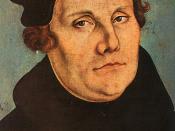Imagine that everywhere you go you are told that you are inferior. Every time you embark on your own you are shut down. A world where all you work for in life is for the indulgence of another. Martin Luther in his "Open Letter to the Christian Nobility of the German State," eloquently delivers a well argued critique on the oppressive nature of the Roman Church and a foundation to infuse the Christians of Germany with the power of the human spirit. Luther directly contended with the Catholic Church in order to cause reform to occur so that all of humanity could equally enjoy spirituality. With ideas "representative of the Northern Christian humanism of the Renaissance," we discover a critical attack on the separation of temporal and spiritual offices, the self elevated authority of the Roman church, the lavishness and pride the pope holds, and the over excessive expenditures that the church exacts from the Christians of Germany and of other countries.
Luther contends that the distinction created by the Roman church between temporal and spiritual "estates" is hypocrisy and a lie. Luther strongly states that there are no distinctions between temporal and spiritual estates where Christianity is concerned. "It is a pure invention that pope, bishops, priests, and monks are spiritual estate; princes, lords, artisans, and farmers the temporal state." Luther believes "that all Christians are truly of the spiritual estate." In view of the nationalistic spirit of his letter...he wishes all of Germany to know that in this brotherhood of Christianity everyone is as equal. Luther is criticizing the Roman churches ploy to have people believe that one's position in life determines the extent of spirituality one may possess. For Luther, this is absolutely unacceptable. "We are all one body...one faith...Gospel and faith alone make us spiritual and...



Martin Luther and his Critique of the Church
Well-written and interesting to read.
0 out of 0 people found this comment useful.